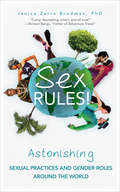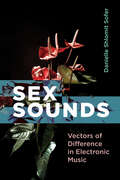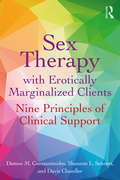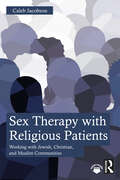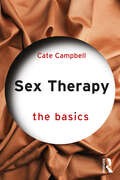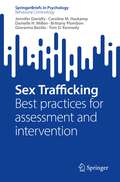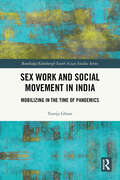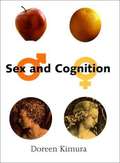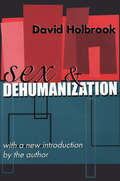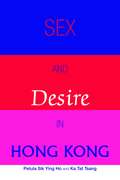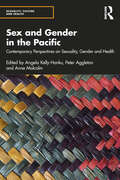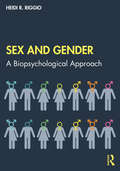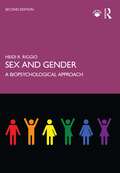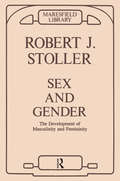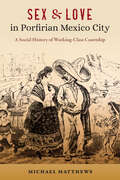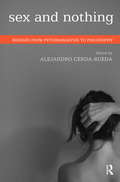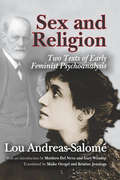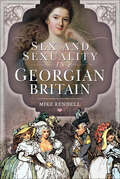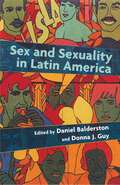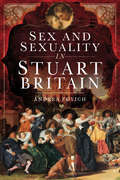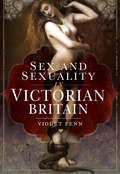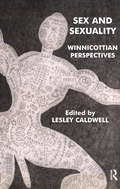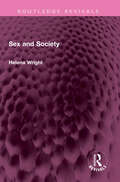- Table View
- List View
Sex Rules!: Astonishing Sexual Practices and Gender Roles Around the World
by Janice Zarro Brodman PHD“[Brodman] shares the results of years of research and world travel to show . . . just how wildly divergent ideas about sexuality and gender roles can be.” —Vice This book is a humorous glimpse of a wide range of stereotype-busting sexual, relationship, and romantic mores around the world. It is fun, interesting, and eye-opening! For example, places where women control the mating game, set marriage rules, and marry one another for political power. The fact that it’s all true also makes it fascinating. Take a romp through a rollicking worldwide tour with LOL views of extraordinary sexual customs. It will astound and regale you. At the same time, it proves sex is like happiness—universally sought but subjectively enjoyed. “This is the world’s weirdest and funniest reality show. But it’s more. It’s fascinating and smart, and all true.” —Richard Bangs, adventurer, author, and TV personality “It’s a scientific fact! Women have better orgasms with funny partners. Read this hilarious book and you’ll have more and better sex, happier relationships and a healthier libido!” —Joanne Sandler, former Deputy Executive Director of the UN Development Fund for Women (UNIFEM), senior associate of Gender@Work, co-producer of the popular podcast Two Old Bitches “Fresh, intriguing and of course titillating . . . delve into rarely seen corners of the world, enjoy a good laugh, and learn from a trained scholar as she takes you on this journey that reveals ‘Sex Rules’ in all their staggering variety.” —Ed Robbins, award-winning director-writer-producer and digital journalist
Sex Sounds: Vectors of Difference in Electronic Music
by Danielle Shlomit SoferAn investigation of sexual themes in electronic music since the 1950s, with detailed case studies of &“electrosexual music&” by a wide range of creators. In Sex Sounds, Danielle Shlomit Sofer investigates the repeated focus on sexual themes in electronic music since the 1950s. Debunking electronic music&’s origin myth—that it emerged in France and Germany, invented by Pierre Schaeffer and Karlheinz Stockhausen, respectively—Sofer defines electronic music more inclusively to mean any music with an electronic component, drawing connections between academic institutions, radio studios, experimental music practice, hip-hop production, and histories of independent and commercial popular music. Through a broad array of detailed case studies—examining music that ranges from Schaeffer&’s musique concrète to a video workshop by Annie Sprinkle—Sofer offers a groundbreaking look at the social and cultural impact sex has had on audible creative practices. Sofer argues that &“electrosexual music&” has two central characteristics: the feminized voice and the &“climax mechanism.&” Sofer traces the historical fascination with electrified sex sounds, showing that works representing women&’s presumed sexual experience operate according to masculinist heterosexual tropes, and presenting examples that typify the electroacoustic sexual canon. Noting electronic music history&’s exclusion of works created by women, people of color, women of color, and, in particular Black artists, Sofer then analyzes musical examples that depart from and disrupt the electroacoustic norms, showing how even those that resist the norms sometimes reinforce them. These examples are drawn from categories of music that developed in parallel with conventional electroacoustic music, separated—segregated—from it. Sofer demonstrates that electrosexual music is far more representative than the typically presented electroacoustic canon.
Sex Therapy with Erotically Marginalized Clients: Nine Principles of Clinical Support
by Damon Constantinides Shannon Sennott Davis ChandlerSex Therapy with Erotically Marginalized Clients: Nine Principles of Clinical Support provides a clinical guide to relational sex therapy with individuals, partnerships, polyships, and alternative family structures where one or more of the clients are erotically marginalized. This term refers to people who are at risk of being pathologized and oppressed both outside and inside the clinical setting due to their gender identities, sexual orientations, or sexual practices. The book outlines nine principles for therapeutic practice which meet the needs of erotically marginalized clients, whose forms of sexuality and desire are rarely spoken about and for whom there is a dearth of language in therapeutic contexts. Each principle concludes with a series of ‘key points’ and then followed by illustrative clinical case studies, contributed by sex therapists and clinicians who self-identify as erotically marginalized and who also work with erotically marginalized clients. The book also provides a full glossary, ‘Defining Erotically Marginalized Identities’. The authors and case contributors use a radical and affirming lens to examine erotically marginalized identities that are often neglected. The book bridges gaps between the past, present, and future in the field of sex therapy and greatly expands the diversity of experiences and identities within the field, particularly the experience of multiple oppressions. The book marks a valuable contribution not only to sex therapists but to the wider clinical and therapeutic community.
Sex Therapy with Religious Patients: Working with Jewish, Christian, and Muslim Communities
by Caleb JacobsonSex Therapy with Religious Patients is a comprehensive guidebook for mental health professionals who work with those struggling with sexual issues within a religious context. The book provides practical guidance on how to approach sensitive topics related to sex and religion, including addressing religious beliefs and values that may impact sexual behavior, beliefs, and attitudes.Drawing on research and clinical experience, the book offers a range of evidence-based interventions for working with individuals from different Jewish, Christian, and Muslim backgrounds. It also explores the unique challenges and opportunities presented by patients’ religious beliefs and provides strategies for integrating spirituality into the therapeutic process.The book is written in an accessible and engaging style, with real-life case examples and exercises that can be used in therapy sessions. It is an essential resource for mental health professionals seeking to enhance their skills in working with religious individuals who are seeking sex therapy.
Sex Therapy: The Basics (The Basics)
by Cate CampbellSex Therapy: The Basics offers an introduction to modern sex therapy and is essential reading for anyone working professionally with sexual issues or just interested in sex. This book contains all you need to know to get started, find more information or learn how and when to refer. Current approaches to sex therapy are described, along with detailed interventions and approaches which address an array of sexual issues to bring qualified sex therapists up to date and introduce learners to the essentials. Helping the reader make informed choices about professional development and to find the most appropriate solutions for patients and clients, this book answers all your sex therapy questions. As well as being essential reading for those considering or interested in sex therapy, this book is a valuable resource for both trainee and experienced therapists, offering contemporary information and advice about assessing and treating a wide range of sexual problems.
Sex Trafficking: Best practices for assessment and intervention (SpringerBriefs in Psychology)
by Jennifer Davidtz Tom D. Kennedy Danielle H. Millen Caroline M. Haskamp Brittany Plombon Giovanna BasilioThis Brief proposes best practices for assessment and intervention with sex trafficking survivors, rooted in the existing theory and practice literatures. Based in current research and clinical practice, these recommendations are embedded in the context of cultural sensitivity. This volume provides a relevant, practical, and informative outline of sex trafficking, associated legal aspects, and best practices for mental health clinicians to aid in successful treatment of sex trafficking survivors.
Sex Work and Social Movement in India: Mobilizing in the Time of Pandemics (Routledge/Edinburgh South Asian Studies Series)
by Toorjo GhoseThis book examines and theorizes about the emergence, growth, impact, collapse, and rejuvenation of a sex worker movement in India, exploring the manner in which the two pandemics – HIV and COVID-19 – bookended a feminist movement through more than a quarter of a century, shaping its trajectory over the course of that time.Focusing on the sex workers’ collective Durbar Mahila Samanwaya Committee (DMSC) in Kolkata, the book asks these questions: How did a sex workers’ collective rise from the margins of Indian society during the HIV pandemic, to become the vanguard of a global sex work movement, with half a million members, and partner collectives stretching across the world? What were the strategies deployed by the collective to engage with the health, social, and political landscapes surrounding it? Moreover, what were the factors that led to the splintering of a solidarity that had endured for a quarter of a century? Finally, what does the DMSC story tell us about social movements that rise from the extreme margins of society in postcolonial contexts? Drawing on empirical research, the author explores the conceptual and practice implications for the fields of social movement, feminist, public health, and postcolonial political scholarship. The book suggests that activist, public health, social work, and policy initiatives in poor women’s communities in postcolonial contexts need to be informed by the temporal, community, organizational, institutional, and affective markers that emerge in the research.The first book to examine the DMSC sex work movement in India as a significant feminist movement of our times, this book will be of interest to researchers from a wide range of disciplines, including South Asian Studies, Sociology, Social Work, Public Health, Gender and Sexuality Studies, and Political Science.
Sex and Cognition
by Doreen KimuraThe aim of this book is to provide an intelligible overview of the field of sex differences in cognition for the educated non-specialist. The book is not intended as an exhaustive reference work on the subject, though it presents all the major findings.
Sex and Dehumanization
by David HolbrookNever before published in the United States, David Holbrook's study offers the sort of common sense all too uncommon in this area of study. His essential premise is that sex has become converted from an instrument for the expression of happiness and affection into an end unto itself. In the search for sexual liberation, all that has been accomplished is the mechanization of sexuality and the destruction of the full range of emotions that nourish the human search for social and biological meaning. Sex and Dehumanization is one of those rare books that will immediately strike the reader as part of the common wisdom that has somehow been lost in a search for the pleasure principle unhinged from other values and goals.During the past quarter century, Holbrook argues, not only has the concept of sex become increasingly separated from the rest of existence, but sex casualties have increased disastrously. The spread of AIDS has brought an ominous and deadly manifestation of this thesis into the human equation, yet at the same tune the response to this menace has been nothing short of manic denial. A similar picture emerges in less deadly forms. Whatever statistics one examines, whether those of sexual activity among young children, abortion, or sexual disease, one finds a grim antidote to any hopes of progress in the sphere of human dealings with the sexual. Holbrook locates many of the problems involved in this separation of sex and affection in the emergence of the idea that our lives are governed by impersonal forces beyond human control.Sex and Dehumanization is in the great tradition of social history and psychiatric analysis. Robert Nye, writing in the Scotsman, says that "Holbrook's diagnosis of our unease should be attentively studied by all who really care about sex and love and the responsibility of freedom." Gabriel Pearson, in the Guardian echoes this sentiment, adding that "never has such a secular ethic been so firmly and urgently and usefully stated." And John Rex sees the book "as containing the germs of important and central moral discussion."
Sex and Desire in Hong Kong
by Petula Sik Ying Ho A. Ka Tat TsangThe anthology provides an exemplary methodological model of community-based research through the authors' studies on sexual and erotic attitudes and practices of gay men and middle-aged women in Hong Kong over the last fifteen years. This collection focuses on issues that have major scholastic contribution to the field, namely, the voices of women on issues of sex and desire, and the investigation of multiple sex relationships among Hong Kong men and women. It also addresses clinical psychological issues and sex education topics that serve to enrich the current state of sexuality studies. The book reveals the social changes, trends, movements, and processes in Hong Kong and across China, thereby highlighting the reality of coloniality and how our experience of desire/ sexuality is conditioned by broad, global and socio-political forces.
Sex and Gender in the Pacific: Contemporary Perspectives on Sexuality, Gender and Health (Sexuality, Culture and Health)
by Peter Aggleton Angela Kelly-Hanku Anne MalcolmThis book examines sex, sexuality, gender and health in the Pacific with a focus on three key sets of issues: young people, culture and education; sexual and reproductive health and well-being; and belonging, connectedness and justice. Bringing together the work of scholars from across the Pacific region, this innovative volume showcases traditional knowledge and diverse disciplinary scholarship of policy and practice relevance. In addition to focusing on relationships, health, education, family and community, chapters engage with a number of cross-cutting themes, including violence, justice and rights, and sexuality and gender diversity. Drawing on the diversity and richness of the Pacific, its cultures, languages and people, the book lays the foundations for future conversations and scholarship for, and by, those within the Pacific. Sex and Gender in the Pacific is an important resource for students, researchers and practitioners working in Pacific studies, sexuality and gender studies, public health, nursing, public policy, sociology, education and anthropology.
Sex and Gender: A Biopsychological Approach
by Heidi R. RiggioUsing both scientific and feminist approaches in its analysis, Sex and Gender: A Biopsychological Approach provides a current and comprehensive understanding of its titular topics, making it an invaluable textbook for instructors and students. Sex and gender can only be properly understood when examined in the contexts of biological, psychological, and social processes and the interactions between those processes. The structure of this book facilitates this necessary exhaustive discussion: First section: a biological analysis that discusses evolutionary, cellular, and genetic processes, and their effects on physical and behavioral development Second section: a psychological and sociological analysis that discusses stereotypes, sexism, and theories of gender Final section: a discussion of the current global challenges surrounding sex and gender, such as discrimination and religious and social oppression of various groups Across chapters: bonus features that can be used as discussion topics, student essay topics, or special topics for instructors to expand the text’s discussion into the classroom The text’s unique focus on biological, psychological, and social processes – as separate entities and interacting processes – make Sex and Gender crucial for a comprehensive and advanced understanding of the subject. This is an essential resource for instructors who want to bring a thorough and complex analysis of sex and gender studies to their classrooms.
Sex and Gender: A Biopsychological Approach
by Heidi R. RiggioThe second edition of this popular textbook provides a current and comprehensive understanding of sex and gender that incorporates biological, psychological, and social approaches. Using both scientific and feminist approaches in its analysis, this book shows how sex and gender can only be properly understood when taking into account biopsychological approaches and the interactions between these processes.The first section discusses a biological analysis that includes evolutionary, cellular, and genetic processes. The second section considers a psychological and sociological analysis that discusses stereotypes, sexism, and theories of gender. The third section discusses current global challenges surrounding sex and gender, such as discrimination and religious and social oppression of various groups. The new edition has been thoroughly updated to include more discussion of gender identities such as nonbinary and gender fluid, as well as more coverages of global LGBTQIA+ rights and more global cultures and reproductive rights across the world.Sex and Gender is an invaluable textbook that considers biological, psychological, and social processes as separate entities and interacting processes. It is an essential resource for students and instructors on courses relating to sex and gender, the psychology of gender, gender studies, and women’s studies who are looking for a thorough analysis of sex and gender studies.
Sex and Gender: The Development of Masculinity and Femininity
by Robert J. StollerIn this book, the author describes patients with marked abberrations in their masculinity and feminity--primarily transsexuals, transvestites and patients with marked biological abnormalities of their sex - in order to find clues to gender development in more normal people.
Sex and Gender: The Human Experience (4th edition)
by James A. Doyle Michelle A. PaludiWell-organized and highly readable Sex and Gender: The Human Experience provides a current, multicultural analysis of gender-related issues, theories, and research. The authors' clear presentation of the perspectives and issues related to sex and gender studies enables students to easily comprehend the material. Further, a highly practical approach prompts students to examine their self-awareness and social tolerance. Sex and Gender: The Human Experience is appropriate as a primary or supplementary text in Psychology, Family Studies, or Women's Studies curricula.
Sex and Love in Porfirian Mexico City: A Social History of Working-Class Courtship
by Michael MatthewsExploring the sexual lives of the poor and working class in turn-of-the-century Mexico This social history explores the romantic and sexual lives of the poor and working class in Mexico City during the rule of dictator Porfirio Díaz from 1876 to 1911. By analyzing sexually based crime cases and stories in the penny press, Michael Matthews sheds light on everyday struggles, joys, and desires. Matthews argues that lower-class individuals had more liberated sexual lives than their wealthier counterparts, influenced by the city’s growth and cultural changes. In this book, Matthews examines how Mexico City’s expanding infrastructure, increasing factory work, and new leisure and entertainment activities shaped courtship and sexual practices. He delves into the world of tenement buildings and street life to reconstruct days defined by love and desire, romance and rape, seduction and sex work, and promises kept and broken. Matthews connects the sexual culture of the poor to the changes taking place as the Mexican state modernized and underwent tremendous capitalist growth and development. Sex and Love in Porfirian Mexico City provides insights into how social and economic developments shaped cultural norms surrounding honor, marriage, morality, and parental authority during this period. It will spur new reflections on the possible influence of lower-class culture on modern-day romance and sexual values.
Sex and Nothing: Bridges from Psychoanalysis to Philosophy
by Alejandro Cerda-RuedaFrom its etymological roots, sex is related to a scission, Latin for sectus, secare, meaning "to divide or cut." Therefore, regardless of the various studies applied to defining sex as inscribed by discursive acts, i.e. merely a 'performatively enacted signification,' there is something more to sex than just a social construction or an aprioristic substance. Sex is irreducible to meaning or knowledge. This is why psychoanalysis cannot be formulated as an erotology nor a science of sex (scientia sexualis). In this matter, sex escapes the symbolic restraints of language; however, it is through its failure that it manifests itself through the symbolic, e.g. symptoms or dream life. So, what is sex? Sex and Nothing embarks upon a dialogue between colleagues and friends interested in bridging psychoanalysis and philosophy, linking sex and thought, where what emerges is a greater awareness of the irreducucibility of sex to the discourse of knowledge and meaning: in other words, sex and nothing.
Sex and Religion: Two Texts of Early Feminist Psychoanalysis
by Lou Andreas-SalomeAs a psychoanalyst and author, Lou Andreas-Salome traverses the mystery of sexuality in much of her work. This book, comprised of two texts originally written for adolescents, uniquely explores sexual education and the collision of sexuality and religion across the lifespan.The first piece, "Three Letters to a Young Boy" (1917), is a psychoanalytic fairy tale. The letters offer an interesting version of the evolution of sexual knowledge from childhood through adolescence. The second piece, "The Devil & His Grandmother" (1922), merges sexuality with religion, encapsulating three ages of woman child, to a lost soul and the Devil's bride, to the Devil's Grandmother. Written in charmingly convoluted dialogue, this work has a cinematic, fanciful feel. Both pieces dispense with academic formality and point to a relaxed new phase in Salome's writing life. Interestingly, this tone can also be detected in her blossoming correspondence with Sigmund Freud, which contrasts starkly with her sombre letters to Rainer Maria Rilke.It is with the spirit of free thinking demonstrated in these two selections, perhaps informed by Salome's experimentation with free association, that the reader is transported to a new theatre of Salome's imagination.
Sex and Sexuality in Georgian Britain
by Mike Rendell“A thorough examination of the morals and mindset of Georgian Britons towards sex and sexuality . . . well-written, engaging and educational.” —Caitlyn Lynch, USA Today-bestselling authorPeek beneath the bedsheets of eighteenth- and early nineteenth-century Britain in this affectionate, informative and fascinating look at sex and sexuality during the reigns of Georges I-IV. It examines the prevailing attitudes towards male and female sexual behavior, and the ways in which these attitudes were often determined by those in positions of power and authority. It also explores our ancestors’ ingenious, surprising, bizarre and often entertaining solutions to the challenges associated with maintaining a healthy sex life.Did the people in Georgian Britain live up to their stereotypes when it came to sexual behavior? This book will answer this question, as well as looking at fashion, food, science, art, medicine, magic, literature, love, politics, faith and superstition through a new lens, leaving the reader enlightened and with a new regard for the ingenuity and character of our ancestors.“This book was funny, at times, and for a slim volume is quite comprehensive . . . Good introduction to the period, very easy to read and entertaining.” —Rosie Writes . . .
Sex and Sexuality in Latin America: An Interdisciplinary Reader
by Daniel Balderston Donna GuyDespite the explosion of critical writing on gender and sexuality, relatively little work has focused on Latin America. Sex and Sexuality in Latin America: An Interdisciplinary Readerfills in this gap. Daniel Balderston and Donna J. Guy assert that the study of sexuality in Latin America requires a break with the dominant Anglo-European model of gender. To this end, the essays in the collection focus on the uncertain and contingent nature of sexual identity. Organized around three central themes--control and repression; the politics and culture of resistance; and sexual transgression as affirmation of marginalized identities--this intriguing collection will challenge and inform conceptions of Latin American gender and sexuality. Covering topics ranging from transvestism to the world of tango, and countries as diverse as Mexico, Brazil, and Argentina, this volume takes an accessible, dynamic, and interdisciplinary approach to a highly theoretical topic. "Opens up new conceptual horizons for exploring gender and sexuality. . . . In stimulating readers to think 'outside the box' of established academic notions of sexuality and gender, Sex and Sexuality in Latin America illustrates the sometimes mind-boggling mission of iconoclastic scholarship. The well-written essays are thought-provoking analyses on the cutting edge of gender scholarship."-Latin American Research Review, vol. 36, no. 3, 2001
Sex and Sexuality in Stuart Britain
by Andrea ZuvichAn expert in Stuart England examines the sexual lives of Britons in the seventeenth and early eighteenth centuries in this frank, informative, and revealing history.Acclaimed Stuart historian Andrea Zuvich explores the sexual mores of Stuart Britain, including surprising beliefs, bizarre practices, and ingenious solutions for infertility, impotence, sexually transmitted diseases, and more. Along the way, she reveals much about the prevailing attitudes towards male and female sexual behavior.Zuvich sheds light not only on the saucy love lives of the Royal Stuarts, but also on the dark underbelly of the Stuart era with histories of prostitution, sexual violence, infanticide, and sexual deviance. She looks at everything from what was considered sexually attractive to the penalties for adultery, incest, and fornication.Sex and Sexuality in Stuart Britain touches on the fashion, food, science, art, medicine, magic, literature, love, politics, faith and superstition of the day.
Sex and Sexuality in Victorian Britain
by Violet Fenn&“Dull this book is not, and it gives an insight into the many scandals not spoken about in polite Victorian drawing rooms.&” —Glasgow & West of Scotland Family History Society Peek beneath the bedsheets of nineteenth-century Britain in this affectionate, informative and fascinating look at sex and sexuality during the reign of Queen Victoria. It examines the prevailing attitudes towards male and female sexual behavior, and the ways in which these attitudes were often determined by those in positions of power and authority. It also explores our ancestors&’ ingenious, surprising, bizarre and often entertaining solutions to the challenges associated with maintaining a healthy sex life. Did the people in Victorian times live up to their stereotypes when it came to sexual behavior? This book will answer this question, as well as looking at fashion, food, science, art, medicine, magic, literature, love, politics, faith and superstition through a new lens, leaving the reader uplifted and with a new regard for the ingenuity and character of our great-great-grandparents. &“I would say this book gives you the information on relationships, genders and very much behavior that doesn&’t usually come across in history books. Therefore this is an excellent book indeed, certainly one that more people should be aware of and learn from.&” —UK Historian &“The writing is joyous and it is clear the author enjoys her subject and is fairly knowledgeable on things Victorian.&” —Rosie Writes &“Fenn&’s writing is so readable and it&’s clear this is a book written by a historian who loves her subject and is very knowledgeable about the research being carried out by other historians.&” —Jessticulates
Sex and Sexuality in Victorian Britain
by Violet Fenn&“Dull this book is not, and it gives an insight into the many scandals not spoken about in polite Victorian drawing rooms.&” —Glasgow & West of Scotland Family History Society Peek beneath the bedsheets of nineteenth-century Britain in this affectionate, informative and fascinating look at sex and sexuality during the reign of Queen Victoria. It examines the prevailing attitudes towards male and female sexual behavior, and the ways in which these attitudes were often determined by those in positions of power and authority. It also explores our ancestors&’ ingenious, surprising, bizarre and often entertaining solutions to the challenges associated with maintaining a healthy sex life. Did the people in Victorian times live up to their stereotypes when it came to sexual behavior? This book will answer this question, as well as looking at fashion, food, science, art, medicine, magic, literature, love, politics, faith and superstition through a new lens, leaving the reader uplifted and with a new regard for the ingenuity and character of our great-great-grandparents. &“I would say this book gives you the information on relationships, genders and very much behavior that doesn&’t usually come across in history books. Therefore this is an excellent book indeed, certainly one that more people should be aware of and learn from.&” —UK Historian &“The writing is joyous and it is clear the author enjoys her subject and is fairly knowledgeable on things Victorian.&” —Rosie Writes &“Fenn&’s writing is so readable and it&’s clear this is a book written by a historian who loves her subject and is very knowledgeable about the research being carried out by other historians.&” —Jessticulates
Sex and Sexuality: Winnicottian Perspectives (The\winnicott Studies Monograph Ser.)
by Lesley Caldwell"Winnicott" and "sex" are two subjects that are rarely associated with one another. Sexuality is not a prominent theme within the work of Winnicott, who preferred to concentrate on the development of the self from infancy. However, his writings contain unexplored insights into sexuality and it is these hidden insights that prompted the author to invite papers from leading analysts to expand upon them. This collection provides a fresh and innovative look at the work of Winnicott and into sexuality, in particular infantile sexuality. The unusual link of Winnicott to Freud and to a psychoanalysis located in the drives encourages a different perspective into British psychoanalysis. Other diverse themes include a historical examination of Winnicott through the British Society; an exploration of the similarities between Laplanche and Winnicott; the use of Winnicott's work in the treatment of sexual dysfunction; and the interrelation between sexuality and play. This is the sixth volume in the Winnicott Studies Monograph Series.
Sex and Society (Routledge Revivals)
by Helena WrightFirst published in 1968, Sex and Society presents and analyses the code of sexual behaviour based on the universal use of contraceptive methods. It includes discussion of all forms of sexual activity, and emphasises in particular the attitudes that should be adopted in sex education. Backed up by case histories, and including details of reforms in abortion and homosexual law, this book sheds light on a topic which continues to cause concern in modern times. The author had been in active contact with all kinds of sexual problems for over thirty years in her professional clinic practice, and in her travels in India, Poland and Denmark teaching contraceptive techniques to doctors and nurses. Her experience as a Founder Member of the International Planned Parenthood Federation and participation in all the International and Regional Conferences gave her a very wide knowledge of sexual and social problems throughout the world. This book will be of interest to students of medicine, sexuality studies, psychology, gender studies, and health.
